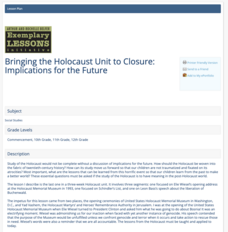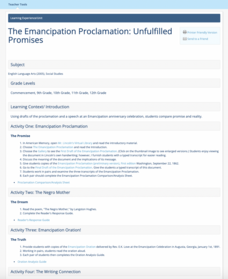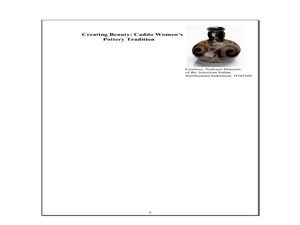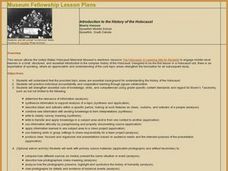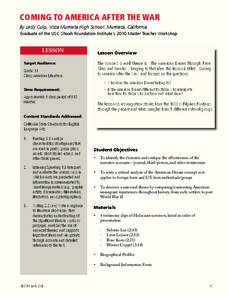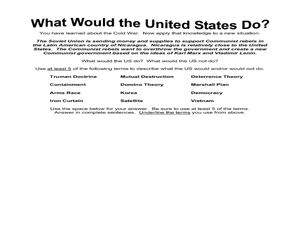Curated OER
Arkansas Civil War Bandits and Outlaws
Young historians study civilian Arkansas during the Civil War. They look at the many challenges they faced to keep their homes in order while the men were at war. Learners hear stories of bands of outlaws who ravaged the state during...
US House of Representatives
The Women of Congress Speak Their Mind
A picture may be worth a thousand words, but words can tell many stories. To conclude their study of the women who have served in the US Congress until 2006, groups analyze statements made by these remarkable women.
Curated OER
Exploring 9/11 in Historical, Cultural and International Context: Why Here, Why Us, Why Now?
Students examine the international conflicts that might have caused the terrorist attacks of 9/11. In groups, they research the similarities and differences between the three major religions and how they connect to 9/11. To end the...
Curated OER
The Four Corners Region of the United States Cultures, Ruins and Landmarks
Students who live in the inner city are introduced to the four corners region of the United States. In groups, they examine how the region differs compared to where they live and their culture. They develop maps of the area and locate...
Curated OER
Border History
Students research primary sources to construct an outline of a border city's history.
Curated OER
Gullah Contributions to South Carolina History
Students research the Gullah people and their impact on South Carolina. In this South Carolina history lesson, students study, locate, and color the region of Africa the Gullah people came from. Students listen to Gullah music and watch...
Curated OER
Bringing the Holocaust Unit to Closure: Implications for the Future
Students study the history of the Holocaust. it is complex; therefore, understanding its implications is complex as well. Elie Wiesel refers to the Holocaust as a question within a question. Questions lead to further questions, and still...
Curated OER
The Emancipation Proclamation: Unfulfilled Promises
Young scholars perform research into the Emancipation Proclaimation. The document will aid learners in understanding the history and culture of the time of writing. Finally critical thinking skills are used to formulate contextual meaning.
Curated OER
Novel Ideas: History of the American Novel
Explore the history of the American novel in the contexts of literature and US history. How does a novel or piece of writing from a particular time showcase the mood during that historical period? After conducting research and discussing...
Curated OER
Indian Women in Texas History
Fourth graders study Indian women in Texas. In this US history lesson, 4th graders discuss what each Indian woman's contribution was by completing a timeline and table. Students examine the Caddo Women's pottery tradition and write an...
Alabama Department of Archives and History
Alabama's 1901 Constitution
"We, the People of the State of Alabama. . ." Did you know that the Alabama State Constitution has 357,157 words while the US Constitution has only 4,400? And that it has 798 amendments while the US Constitution has 27? Class groups...
Curated OER
Photography and the National Park Service
During the 1800s the United States was expanding westward; land was there for the taking. Kids explore how some early photographers used their photography to influenced the US Congress to save areas like Mirror Lake. They complete a...
US House of Representatives
Permanent Interests: The Expansion, Organization, and Rising Influence of African Americans in Congress, 1971–2007
The fourth installment of the seven-lesson unit focused on African Americans elected to and serving in the US Congress looks at the period from 1971 through 2007. Class members read a contextual essay that provides background information...
Smithsonian Institution
A New America: The Hart-Celler Immigration Act of 1965
Many dream of coming to America, but few may enter. The lesson explores the Hart-Celler Immigration Act of 1965 and how it changed immigration policies in the United States. Academics learn how immigration quotas impacted Western Europe...
Curated OER
Introduction to the History of the Holocaust
The Holocaust is unbelievable! Examine this piece of history with your class. Using the Internet, research groups determine the relevance of information presented, compare how different sites present the same information, synthesize...
NPR
This Isn't Right: A History of Women in Industry
Women were in the workplace long before Rosie the Riveter pushed up her sleeve. Learn about the working options available to women during the Industrial Revolution, the Progressive Era, and the Great Depression with a instructional...
Library of Virginia
Antebellum Freedom
From indentured servitude to involuntary race-based servitude, slavery has taken many forms in American history. Class members examine three manumission petitions that reveal how the rights of African Americans and African American...
Heritage Foundation
Procedural Amendments: Amendments III, IV, and V
So many US Constitution clauses, so little time. The 17th installment in a 20-part series teaches pupils about the Third, Fourth, and Fifth Amendments. Learning through activities such as group work, connecting to current events, and...
Heritage Foundation
Substantive Amendments: Amendments I and II
The First and Second Amendments remain some of the most famous, even to this day. Learners read about several clauses from the US Constitution through a variety of captivating activities including before and after reading, group work,...
University of Southern California
Coming to America After the War
As part of their exploration of the American dream, class members examine primary source materials to compare immigrant experiences of those arriving early in our country's history to those arriving in the US after World War II. To...
Curated OER
Colonies and Revolution: Comparing US and Mexican History
Students examine the emergence of the United States and Mexico as independent nations. They compare the colonial history of the two countries and discover the emergence of social classes.
Curated OER
Westward Expansion Unit
Eighth graders investigate the importance of Westward Expansion in the history of the United States in this unit of lessons.
Curated OER
What Would the United States Do?
In this U.S. history scenario worksheet, students use their critical thinking skills to explain how the U.S. would respond in a scenario that involves the Soviet Union sending support to Communist rebels in Nicaragua.
Curated OER
Judges in the Classroom Lesson Plan History Of The Bill Of Rights
Learners study the US Constitution, The Bill of Rights, and other amendments. They investigate the people who obtained the Bill of Rights and play a game based on their studies.








